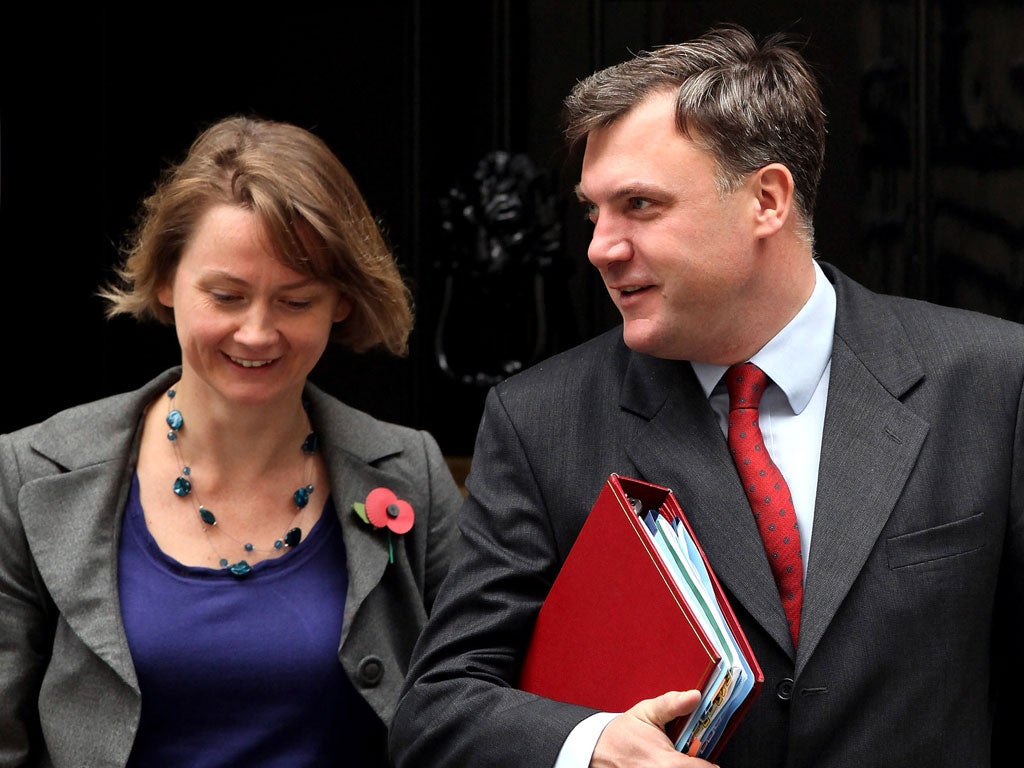John Rentoul: No one to replace Ed Miliband? Try Yvette Cooper
Cooper's politics are not mine but she would be populist on law and order, and she would be noticed


It may have been a good thing that Ed Miliband won the Labour leadership. If his elder brother had won, he would have fought on the centre ground, wanting to cut public spending and to be tough on crime. He would have held his own in the Commons and looked like an alternative prime minister. But I suspect that the Labour Party would have been divided more bitterly than it is now. What I call the Brownite-Sweden wing of the party would have felt cheated, and would be using its machine-politics skills to organise the "alternative to capitalism" idealists against the leadership.
They won the leadership for the younger brother. Theirs was what one insider called "a Brownite coup dressed up as an Obama insurgency", organising the trade unions against the MPs and party members. Had they failed to install their candidate as leader, they would now be complaining about the Blairite conspiracy to deny Labour's true values.
They would be saying that David Miliband should be further ahead in the opinion polls than he is, and that, if Labour offered its dream of Sweden-on-Thames, the grateful voters would respond by sweeping away the hated Coalition, probably long before 2015. The internet would have been awash with articles calling on him to "articulate a coherent vision", by repudiating New Labour and all its evil works. Specifically the Iraq war, academy schools and CCTV.
So, Ed Miliband may have been a necessary phase through which Labour had to pass. It may have been useful to have allowed the Swedes a chance to run the show just so that they could learn that there are no easy alternatives to capitalism, or to New Labour, or, if there are, that the voters don't trust them. As it is, the internet is awash with articles by former supporters of Ed Miliband admitting that they got it wrong. Well, not awash exactly. There was one the other day. But then there were two more important ones, by James Macintyre and Mehdi Hasan, the co-authors of what they called a "sympathetic" biography of the Labour leader, in which they expressed their disillusionment.
Having been through that phase, then, Labour can now try to answer the question: how can it win the next election? An answer was implied by Ed Balls, the Shadow Chancellor, in an interview with the Fabian Review just before Christmas. It attracted interest for his comments that he would "never, ever" put his children's pictures on the front of a Sunday magazine – at just the moment that Ed Miliband's Christmas card, featuring his two sons, was sent out. But I was more interested in the example he chose of the "long, long game" of Opposition. He pointed out that in 1993-94, Tony Blair and Gordon Brown were frustrated that their ideas made no headway, despite John Major raising taxes. Well, something happened in 1994, which was that Labour changed its leader.
Three objections are often raised to this option. First, it is objected that it should not even be discussed. People who see themselves as on the left are told that they ought to keep their views to themselves for the sake of party unity. On that, I am with Hillary Clinton's supporters in 2008, who responded to similar urgings from Barack Obama's people by wearing sweatshirts with "Puma" on them (you can work out what it stood for). The appeal to loyalty is misplaced. Surely those who want to see Labour succeed – for the sake of the country, after all – have a duty to get rid of a leader who is an obstacle to this goal?
Second, the counsel of despair is that: "Labour doesn't ditch its leaders." It is true that it did not get rid of Gordon Brown, which it should have done; but it did get rid of Tony Blair (which it shouldn't have). Brown had taken the precaution of dipping the hands of 313 of 351 Labour MPs in the blood, securing their nominations for his uncontested election. Ed Miliband is in the more dangerous position of knowing that a majority of his colleagues voted against him. They owe no loyalty to him; merely a reluctance to be involved in a plot that doesn't work.
Third, it is said that "you can't beat somebody with nobody"; that there is no alternative leader. Not so. Yvette Cooper could have won in 2010, had she not said that the time was not right for her and supported her husband, Ed Balls, instead. She may be barely known outside Westminster – just ask a normal person who the Shadow Home Secretary is – but she came top of the Shadow Cabinet elections among MPs before Ed Miliband abolished them. If she is clever, the Brownites, Swedes and Blairites could unite behind her. Her politics are not mine, but she would be populist on law and order, and she would certainly be noticed.
And the thing about leadership is that you don't know what someone is really like until they do it.
John Rentoul is chief political commentator for 'The Independent on Sunday'

Join our commenting forum
Join thought-provoking conversations, follow other Independent readers and see their replies